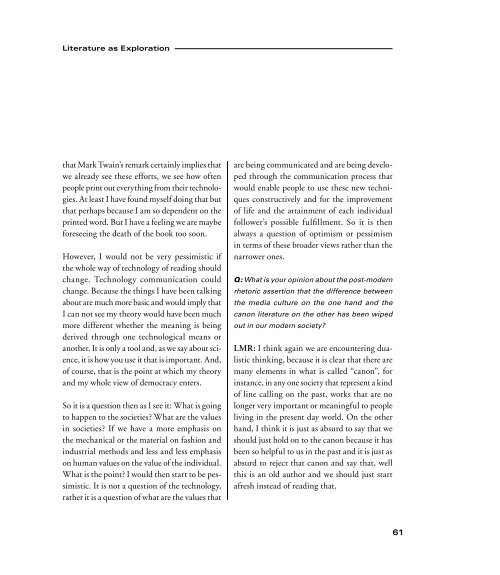Tidskrift för lärarutbildning och forskning 4/2005
Tidskrift för lärarutbildning och forskning 4/2005
Tidskrift för lärarutbildning och forskning 4/2005
You also want an ePaper? Increase the reach of your titles
YUMPU automatically turns print PDFs into web optimized ePapers that Google loves.
Literature as Exploration<br />
that Mark Twain’s remark certainly implies that<br />
we already see these efforts, we see how often<br />
people print out everything from their technologies.<br />
At least I have found myself doing that but<br />
that perhaps because I am so dependent on the<br />
printed word. But I have a feeling we are maybe<br />
foreseeing the death of the book too soon.<br />
However, I would not be very pessimistic if<br />
the whole way of technology of reading should<br />
change. Technology communication could<br />
change. Because the things I have been talking<br />
about are much more basic and would imply that<br />
I can not see my theory would have been much<br />
more different whether the meaning is being<br />
derived through one technological means or<br />
another. It is only a tool and, as we say about science,<br />
it is how you use it that is important. And,<br />
of course, that is the point at which my theory<br />
and my whole view of democracy enters.<br />
So it is a question then as I see it: What is going<br />
to happen to the societies What are the values<br />
in societies If we have a more emphasis on<br />
the mechanical or the material on fashion and<br />
industrial methods and less and less emphasis<br />
on human values on the value of the individual.<br />
What is the point I would then start to be pessimistic.<br />
It is not a question of the technology,<br />
rather it is a question of what are the values that<br />
are being communicated and are being developed<br />
through the communication process that<br />
would enable people to use these new techniques<br />
constructively and for the improvement<br />
of life and the attainment of each individual<br />
follower’s possible fulfillment. So it is then<br />
always a question of optimism or pessimism<br />
in terms of these broader views rather than the<br />
narrower ones.<br />
Q: What is your opinion about the post-modern<br />
rhetoric assertion that the difference between<br />
the media culture on the one hand and the<br />
canon literature on the other has been wiped<br />
out in our modern society<br />
LMR: I think again we are encountering dualistic<br />
thinking, because it is clear that there are<br />
many elements in what is called “canon”, for<br />
instance, in any one society that represent a kind<br />
of line calling on the past, works that are no<br />
longer very important or meaningful to people<br />
living in the present day world. On the other<br />
hand, I think it is just as absurd to say that we<br />
should just hold on to the canon because it has<br />
been so helpful to us in the past and it is just as<br />
absurd to reject that canon and say that, well<br />
this is an old author and we should just start<br />
afresh instead of reading that.<br />
61

















